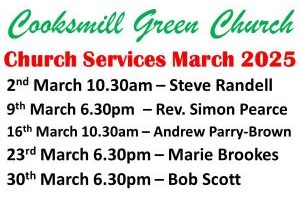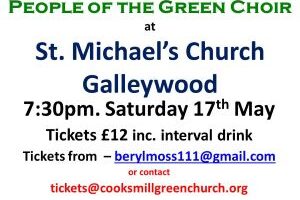Thought for the Month November 2024
Whatever next?
(“to sleep…perchance to dream…”)
As a church organist, I have tended to take All Saints Sunday, the first in November, for granted – put down “For all the saints” on its one annual outing, and be grateful that it is only 8 verses – one modern hymn book has a Saints hymn with 23! This year, though, when Cooksmill offered me the November slot, I decided to focus on the readings for this day, and soon realised that they covered not so much the earthly lives of the various saints, but rather their life after death. Isaiah and Ezra both write of their vision of the kingdom of heaven and, while inevitably this is bound up in and limited by their culture and their humanity, there is so much in common with what Jesus says (and he ought to know!) that their experience demands deeper consideration.
Firstly, what all agree on, is that after death something of our humanity survives. There is sight; there is hearing; there is voice; there is consciousness. There is something of the corporeal – Ezra describes crowns being placed upon the heads of the saints and palms being received by their hands. At the same time, these qualities are different in ways in which John in his first Epistle tells us have yet to be revealed to us. Now we cannot see God; then we shall be like him and shall see him as he is.
Another way in which corporeally we shall be different is that we shall be released from pain and suffering; these are, of course, inevitable adjuncts of our present mortality that will be wiped away. The inevitable language is that of paradox. Eternity is within time and beyond it. We say goodbye to the dead yet they are always with us. We shall never be hungry or thirsty, for the feast in heaven will be one of constant renewal. Or, as E. M. Forster put it: hope exists despite fulfilment, as it will be in heaven.
Our relationship with God will change. Now we are his children; in heaven we shall be acknowledged as his heirs “better than sons or daughters” as Isaiah puts it, inheritors of what as our Father he has destined for us before the world began. As sinners, we will all face judgment; as those who believe in him, we can be assured of his mercy. For we shall be made perfect, and every earthly barrier to peace and reconciliation will be transcended.
One thing that struck me as I read these lessons was this: Revelation describes heaven as full of people from all tribes and peoples and languages. Isaiah is more specific: he tells Jews that non-Jews will not be separated from God’s people; that, for example, eunuchs and others incapable of fulfilling the Jewish rites and laws shall be judged according to their life choices, their behaviour in doing the things that please God, including keeping the Sabbath. Now, I know that not all of you reading this will agree with what I say next, but it has always troubled me that the People of the Book, whose worship and spiritual outlook and culture are so close to those of the Jews, which in turn are so close to our own, should be according to some excluded from heavenly bliss – and that any of them should exclude us. So a thought for All Saints Sunday: if God declares in his scriptures his love for Jew and Muslim, for all who keep his commandments, shouldn’t they (and we) try a little harder to understand, to accept, to love each other?







